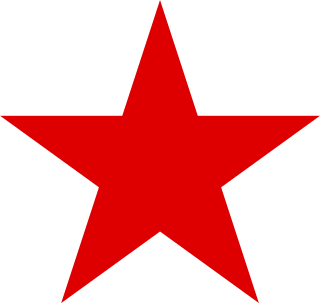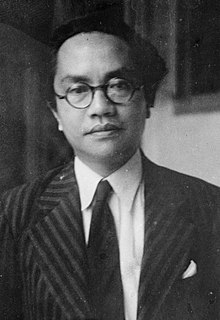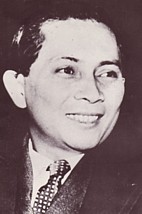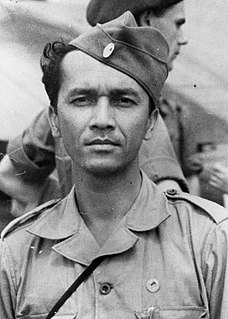| |||||
| Centuries: | |||||
|---|---|---|---|---|---|
| Decades: | |||||
| See also: | |||||
Events in the year 1946 in Indonesia . The country had an estimated population of 69,973,500 people. [1]
| |||||
| Centuries: | |||||
|---|---|---|---|---|---|
| Decades: | |||||
| See also: | |||||
Events in the year 1946 in Indonesia . The country had an estimated population of 69,973,500 people. [1]

The Socialist Party of Indonesia was a political party in Indonesia from 1948 until 1960, when it was banned by President Sukarno.

The Indonesian National Party was the name used by several nationalist political parties in Indonesia from 1927 until the 2000s. The first PNI was established by future President Sukarno. After independence, the new PNI supplied a number of prime ministers, and participated in the majority of cabinets in the 1950s and 1960s. The party was fused into the Indonesian Democratic Party in 1973. In the years following the reforms of the late 1990s, a number of parties claiming to be the continuation of previous PNIs stood in elections, but gained only a handful of seats.

Sutan Sjahrir was an Indonesian revolutionary independence leader and prime minister, described as an idealistic Indonesian intellectual. He became the first prime minister of Indonesia in 1945, after a career as a key Indonesian nationalist organizer in the 1930s and 1940s. From there, Sutan worked hard as Prime Minister to ensure Indonesia was living up to its name. He was considered an idealist and an intellectual who despite his political interest, put his country first before his own needs. Unlike some of his colleagues, he did not support the Japanese and worked to gain independence for Indonesia.

The Linggadjati Agreement was a political accord concluded on 15 November 1946 by the Dutch administration and the unilaterally declared Republic of Indonesia in the village of Linggajati, Kuningan Regency, near Cirebon in which the Dutch recognised the republic as exercising de facto authority in Java, Madura and Sumatra.

Amir Sjarifuddin Harahap, also spelled Amir Sjarifoeddin Harahap was a socialist politician and one of the Indonesian Republic's first leaders, becoming Prime Minister during the country's National Revolution. Amir was a major leader of the left during the revolution. He was killed in 1948 by Indonesian troops following his involvement in the Madiun Affair.

The position of Prime Minister of Indonesia existed from 1945 until 1967. During this period, the prime minister was in charge of the Cabinet of Indonesia, one of the three branches of government along with the People's Representative Council and the president. Following his 1959 decree, President Sukarno assumed the role and powers of prime minister until his resignation in 1966.
This is the Timeline of Indonesian National Revolution (1945–1950)

Sjafruddin Prawiranegara,, was an Indonesian politician, economist, and latterly Islamic philosopher. An early member of the KNIP, he briefly served as the head of government during the Indonesian Revolution when fellow revolutionaries Sukarno and Hatta were captured.

The first Sjahrir Cabinet was the second Indonesian cabinet, named after the Prime Minister. It served from November 1945 to February 1946.

The second Sjahrir Cabinet was the third Indonesian cabinet and the second formed by Sutan Sjahrir. It served from March to June 1946.

The third Sjahrir Cabinet was the fourth Indonesian cabinet. It served from October 1946 to June 1947, when it fell due to disagreements related to implementation of the Linggadjati Agreement and subsequent negotiations with the Dutch.
Vice Presidential Edict No. X was an edict issued by Indonesian Vice-president Mohammad Hatta on 16 October 1945 which gave the Central Indonesian National Committee (KNIP), initially a purely advisory body, the authority to become the legislative body of the government.

"Our Struggle" was a pamphlet written late October 1945 by Indonesian independence leader Soetan Sjahrir. It was pivotal in redirecting the Indonesian national revolution.

Adnan Kapau Gani, often abbreviated as A. K. Gani, was an Indonesian politician. Born in West Sumatra, he spent much of his youth in Java, where he studied medicine and became involved with the nascent nationalist movement before going to South Sumatra to work as a doctor. During the Indonesian National Revolution he served three terms as Minister of Welfare; two of these were concurrent with terms as a deputy prime minister. Afterwards Gani went to Palembang, South Sumatra, where he remained active in politics until his death. In November 2007 Gani was made a National Hero of Indonesia.
Events in the year 1945 in Indonesia. The country had an estimated population of 68,517,300 people.
Events in the year 1947 in Indonesia. The country had an estimated population of 71,460,600 people.
Events in the year 1948 in Indonesia. The country had an estimated population of 72,979,300.
Events in the year 1949 in Indonesia. The country had an estimated population of 74,530,300.

The Ministry of Defense of the Republic of Indonesia, formerly the Department of Defense of the Republic of Indonesia is a government ministry responsible for the defense affairs of Indonesia. The currently-appointed minister is Prabowo Subianto replacing Ryamizard Ryacudu in 23 October 2019.

Arudji Kartawinata was an Indonesian politician and military officer. During the Indonesian National Revolution, he was the first commander of the 3rd Division, predecessor to the modern Siliwangi Division. Politically, he was initially a member of Masyumi before later re-forming the Indonesian Islamic Union Party. He served as the chairman of the People's Representative Council for three years between 1963 and 1966.
| This Indonesian history-related article is a stub. You can help Wikipedia by expanding it. |
| This year in Asia article is a stub. You can help Wikipedia by expanding it. |